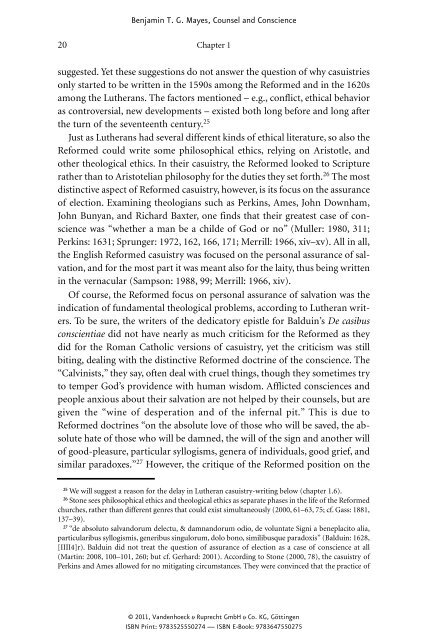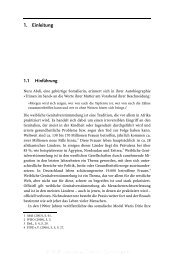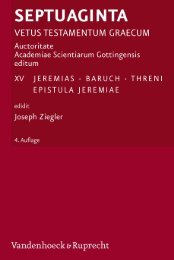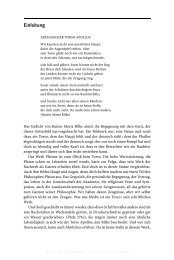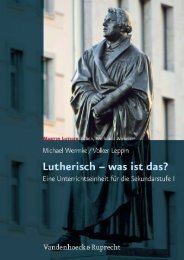Counsel and Conscience
Counsel and Conscience
Counsel and Conscience
Create successful ePaper yourself
Turn your PDF publications into a flip-book with our unique Google optimized e-Paper software.
Benjamin T. G. Mayes, <strong>Counsel</strong> <strong>and</strong> <strong>Conscience</strong><br />
20 Chapter 1<br />
suggested. Yet these suggestions do not answer the question of why casuistries<br />
only started to be written in the 1590s among the Reformed <strong>and</strong> in the 1620s<br />
among the Lutherans. The factors mentioned – e.g., conflict, ethical behavior<br />
as controversial, new developments – existed both long before <strong>and</strong> long after<br />
the turn of the seventeenth century. 25<br />
Just as Lutherans had several different kinds of ethical literature, so also the<br />
Reformed could write some philosophical ethics, relying on Aristotle, <strong>and</strong><br />
other theological ethics. In their casuistry, the Reformed looked to Scripture<br />
rather than to Aristotelian philosophy for the duties they set forth. 26 The most<br />
distinctive aspect of Reformed casuistry, however, is its focus on the assurance<br />
of election. Examining theologians such as Perkins, Ames, John Downham,<br />
John Bunyan, <strong>and</strong> Richard Baxter, one finds that their greatest case of conscience<br />
was “whether a man be a childe of God or no” (Muller: 1980, 311;<br />
Perkins: 1631; Sprunger: 1972, 162, 166, 171; Merrill: 1966, xiv–xv). All in all,<br />
the English Reformed casuistry was focused on the personal assurance of salvation,<br />
<strong>and</strong> for the most part it was meant also for the laity, thus being written<br />
in the vernacular (Sampson: 1988, 99; Merrill: 1966, xiv).<br />
Of course, the Reformed focus on personal assurance of salvation was the<br />
indication of fundamental theological problems, according to Lutheran writers.<br />
To be sure, the writers of the dedicatory epistle for Balduin’s De casibus<br />
conscientiae did not have nearly as much criticism for the Reformed as they<br />
did for the Roman Catholic versions of casuistry, yet the criticism was still<br />
biting, dealing with the distinctive Reformed doctrine of the conscience. The<br />
“Calvinists,” they say, often deal with cruel things, though they sometimes try<br />
to temper God’s providence with human wisdom. Afflicted consciences <strong>and</strong><br />
people anxious about their salvation are not helped by their counsels, but are<br />
given the “wine of desperation <strong>and</strong> of the infernal pit.” This is due to<br />
Reformed doctrines “on the absolute love of those who will be saved, the absolute<br />
hate of those who will be damned, the will of the sign <strong>and</strong> another will<br />
of good-pleasure, particular syllogisms, genera of individuals, good grief, <strong>and</strong><br />
similar paradoxes.” 27 However, the critique of the Reformed position on the<br />
�� We will suggest a reason for the delay in Lutheran casuistry-writing below (chapter 1.6).<br />
�� Stone sees philosophical ethics <strong>and</strong> theological ethics as separate phases in the life of the Reformed<br />
churches, rather than different genres that could exist simultaneously (2000, 61–63, 75; cf. Gass: 1881,<br />
137–39).<br />
�� “de absoluto salv<strong>and</strong>orum delectu, & damn<strong>and</strong>orum odio, de voluntate Signi a beneplacito alia,<br />
particularibus syllogismis, generibus singulorum, dolo bono, similibusque paradoxis” (Balduin: 1628,<br />
[IIII4]r). Balduin did not treat the question of assurance of election as a case of conscience at all<br />
(Martin: 2008, 100–101, 260; but cf. Gerhard: 2001). According to Stone (2000, 78), the casuistry of<br />
Perkins <strong>and</strong> Ames allowed for no mitigating circumstances. They were convinced that the practice of<br />
© 2011, V<strong>and</strong>enhoeck & Ruprecht GmbH & Co. KG, Göttingen<br />
ISBN Print: 9783525550274 — ISBN E-Book: 9783647550275


